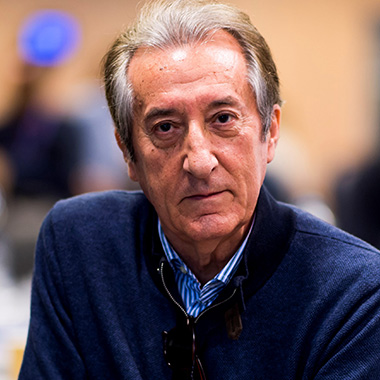Coaches Academy II
7 monthly payments of € 89.29

ALONG THE COURSE, THE PARTICIPANT WILL FIND AN EVOLUTION OF THE LEARNING PROCESS THEORIES, EMPHASISING THE COACH-PLAYER RELATIONSHIP, UNDERSTOOD NOT AS A UNIDIRECTIONAL TRAINING AND FROM TEACHER TO STUDENT, BUT AS A TWO-WAY EXCHANGE WHERE BOTH OF THEM INTERACT AND AGREE ON INTENTIONS AND FOCUSES ON THE PRACTICE. THIS EXCHANGE GOES FROM FEEDBACK TO THE PLANNING OF SPECIFIC, MASSIVE, VARIABLE AND CONTINUOUS PREFERENTIAL SIMULATION SITUATIONS, BY THE USE OF CONSTRAINTS.
Along the years, football has evolved both in its game dynamics, as well as the use and understanding of the sciences that different agents, especially coaches, have relied on to support the actions aimed at optimising the game and its players. Initially, it was based on the application of general training theories, supported by the traditional sciences (mechanistic, behavioural, etc.), for training plans originating from individual sports. Nevertheless, the athlete was "forced" to adapt to game contexts and scenarios, not only related to the technical and tactical needs of the game, but also to the way of learning and interpreting (training) it.
This programme enquire into a new perspective regarding the approach to the developmental processes of athletes immersed in football, which include theories that are based on current sciences (complex dynamic systems, ecological theory, etc.), which have proven to be interesting when creating new training plans. In this aspect, they adjust to the individual (intrapersonal dynamics) and collective (interpersonal dynamics) coordinative needs, giving the coach the possibility of incorporating pedagogical tools in search of awakening the player's curiosity and interest in the game.
EXPERT ADVISORS
Form yourself with renowned experts who know perfectly the peculiarities of the club.
Paco Seirul·lo & Methodology team

Ex - Director of FC Barcelona Methodology Area.

Target audience
TRAINERS / SPORTS COACHES
PHYSICAL TRAINERS
ACADEMY COACHES
SPORTS INSTRUCTORS
Learn to
Understand the practice and competition system as a whole, in order to integrate all the elements and factors that intervene in the process.
As coaches, become self-aware of the information we have in our practice and competition environment, in order to optimise our pedagogical exchange.
Know the optimal conditions of the learning environment in order to optimise the player.
Use video feedback in practice settings as an indispensable resource for motor learning and to develop self-awareness.
PROGRAM
COURSE 1: PEDAGOGICAL EXCHANGE WITH THE PLAYER: THE ROLE OF THE COACH-TRAINER IN THE LEARNING PROCESS
MODULE 1. Critical Thinking and Methodological Context: Where do we come from and where are we going?
Understand what is the ultimate goal of the methodology and how to integrate all the existing elements in the learning context.
MODULE 2. The Coach's Learning: Why do the coaches see what they see?
Understand how their behaviours emerge and how to get in tune with the team's context.
MODULE 3. Coach-Player Interaction: How to optimise the exchange of information and have a greater impact on the learning process?
Understand the environmental conditions through which the player’s naturalised behaviours are facilitated and generated.
MODULE 4. Pedagogical Exchange with the Player. Learning Strategies and Atmosphere.
COURSE 2: PEDAGOGICAL EXCHANGE WITH THE PLAYER: VIDEO FEEDBACK IN THE CONTINUUM OF MOTOR PRACTICE
MODULE 1. Observational learning how to give feedback? Understand what differential aspects are added in the coach's work when combining visual feedback with physical practice.
MODULE 2. Training practices. Where to give the feedback? Pay attention as a coach to the resulting effect on the player of the relationship between the practice context and the intervention style.
MODULE 3. Exchange with the player through observational learning. Anticipate and concrete multimodal extrinsic information to enhance the motor learning process.
MODULE 4. The visual feedback on video. Why give video-feedback? Alter the viewing speed to specify the interaction.
COURSE 3: PEDAGOGICAL EXCHANGE WITH THE PLAYER: THE DESIGN OF THE PREFERENTIAL SIMULATION SITUATIONS (PSS) IN RELATION TO THE PREFERENCE OF DIDACTIC CONTENT
MODULE 1. Coordinative Preference PSSs.
MODULE 2. Cognitive Preference PSSs.
MODULE 3. Contextual Preference PSSs.
MODULE 4. Cross-sectional parameters: introduction to variability and oriented or exploratory planning.
What does it include?

24-HOUR ACCESS TO STUDY MATERIAL, FROM ANYWHERE, ON ANY DEVICE

VIRTUAL COACHING, FOLLOW-UP, AND SUPPORT FROM A SUBJECT EXPERT

ACTIVITIES AND ASSESSMENTS WITH PERSONALIZED FEEDBACK

CERTIFICATE ISSUED AND ENDORSED BY BARÇA INNOVATION HUB - UNIVERSITAS.